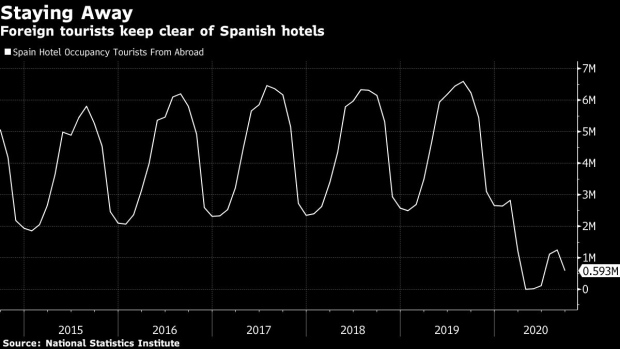Oct 25, 2020
Canary Islands Open to Tourists Even With Virus Surging in Spain
, Bloomberg News

(Bloomberg) -- Jorge Marichal, a Spanish hotelier, is breathing a sigh of relief after the U.K. and Germany opened up travel corridors to the Canary Islands, throwing a lifeline to a sun-soaked archipelago heavily reliant on winter tourism.
“The news is very positive, but we have to take things calmly,” said Marichal, who runs hotels and apartment complexes on the islands of Tenerife and La Gomera. “We hope all our customers will return and leave happy and healthy with a good sun tan.”
The coronavirus pandemic has laid waste to a Spanish tourism industry that has seen foreign visitor numbers slump by almost three-quarters in the year through August. The U.K. and Germany easing travel to the Canary Islands gives the archipelago the chance to salvage some of its business supplying northern Europeans with a dose of winter sunshine.
The U.K. announced on Thursday that it would no longer make Britons returning from the region undergo two weeks of quarantine. That requirement remains in force for the rest of Spain, where virus cases have surged back to peak levels and hospitalizations are rising.
The lifting of the U.K. restrictions takes effect on Sunday. The decision followed a similar move by Germany.
The good news for the Canaries is a rare ray of sunshine in a bleak year for Spain as it struggles to contain the virus and its impact on a tourism industry that accounts for more than 10% of the economy. Prime Minister Pedro Sanchez said Friday that more than 3 million people in Spain have caught the virus, a figure some three times higher than official data, and the government is now mulling new restrictions to try to tame the spread.
The Canaries -- a chain of several islands far closer to the Western Sahara than to mainland Spain -- have been relatively unscathed by the virus, though the local economy has been devastated by the economic impact of travel restrictions.
On Tenerife, only about a fifth of the island’s hotels are open and those that are have an occupancy rate of just 15% to 20%, said Marichal, who is chairman of Ashotel, the industry association for the island and three others including La Palma, La Gomera and El Hierro. About 750 hotels serve visitors to the Canaries, according to the regional government’s website.
Marichel is hopeful that the pickup in business will mean he can soon welcome tourists again to the two hotels he runs on Tenerife that have been closed since March.
The easing of restrictions on travel from the U.K. and Germany, the islands’ two biggest markets, could help salvage some of the key Christmas season in an archipelago that boasts average temperatures of about 70 degrees Fahrenheit (21 Celsius) in December. Germans and Britons looking to escape the dreary winters of northern Europe accounted for more than half of all visitors to the Canaries in December of last year.
The lifting of restrictions is a testament to the work done by regional authorities to make the islands safe for visitors, Hugh Elliott, the British ambassador to Spain, said on Twitter. In the last seven days, the Islands have recorded 44 Covid-19 cases per 100,000 inhabitants, by far the lowest figure for any Spanish region.
“A hotel is a bit like a ship that can quickly get running again when you start the engine” said Tom Smulders, vice chairman of the Hotel and Tourism Business Association for Las Palmas, the capital of Gran Canaria.
He runs two apartment buildings with a combined capacity of about 175 beds. Last week he had one guest.
©2020 Bloomberg L.P.